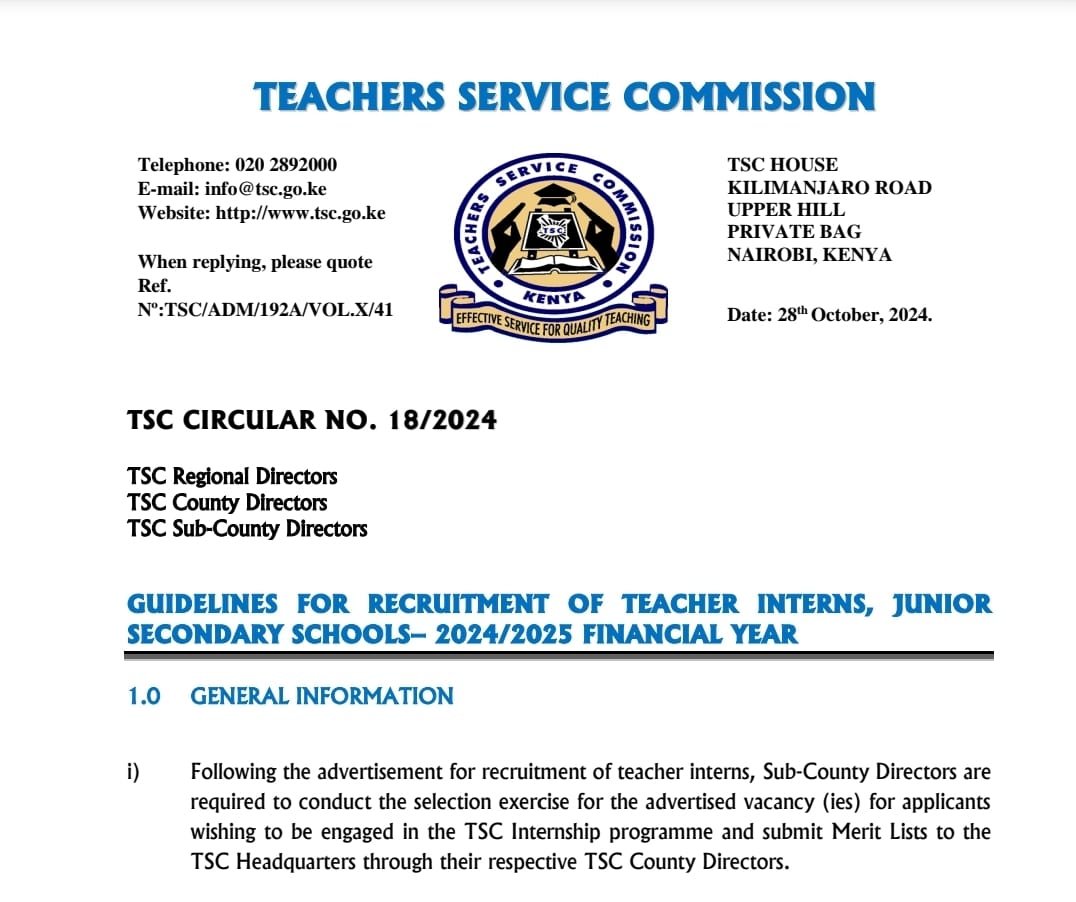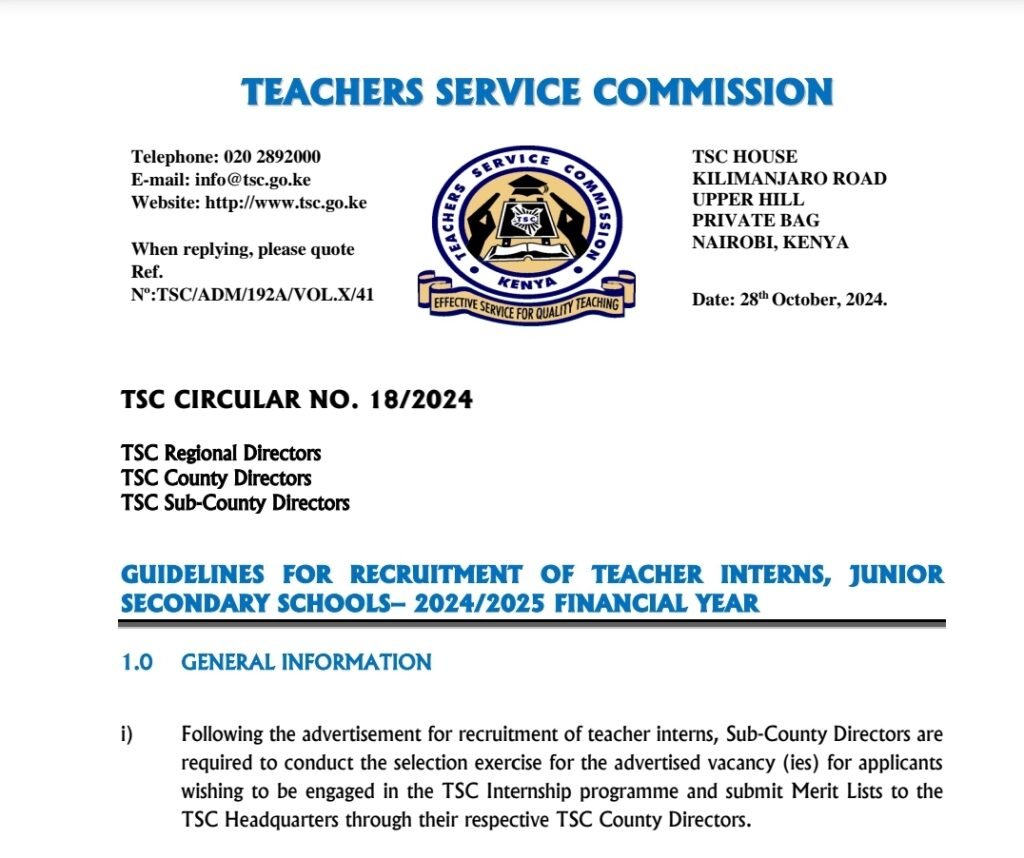Insight into the Overwhelming Demand for TSC JSS Internship Positions: 20,000 Vacancies, 279,645 Applications

TSC circular

Introduction
The recent announcement by the Teacher Service Commission (TSC) regarding the availability of 20,000 junior secondary school (JSS) teacher intern positions has garnered significant attention across the educational landscape. This recruitment drive reflects a critical need for qualified educators to support the new educational framework aimed at enhancing quality learning in junior secondary schools. The response to this advertisement has been nothing short of phenomenal, with a staggering 279,645 applications submitted by hopeful candidates.
The sheer volume of applications indicates a robust interest in these teaching roles, suggesting that many individuals are eager to embark on a career in education. This level of enthusiasm speaks to the potential shifts in the employment market, particularly within the teaching sector, and highlights the important role that intern positions can play in the professional development of new educators. Aspiring teachers are evidently seeking opportunities to gain practical experience, mentorship, and a foothold in the competitive education field.
Furthermore, this overwhelming response prompts a closer examination of the implications surrounding the recruitment process and the future of teaching in junior secondary schools. High demand for TSC JSS internship positions not only underscores the urgency for action in addressing educational needs but also raises questions about the selection process, the expectations for candidates, and the support systems in place for interns. Understanding these dynamics is crucial for stakeholders, including educational policymakers, training institutions, and potential applicants.
As we delve deeper into this subject, it becomes essential to analyze the motivations behind such a significant number of applications and what this demonstrates about the current educational environment in the country.
Background on TSC’s Internship Program
The Teachers Service Commission (TSC) of Kenya established its internship program to enhance teacher development, improve educational quality, and address the growing need for experienced educators in the country’s schools. This initiative offers recent graduates an opportunity to gain practical teaching experience in real classroom settings. The internship positions not only serve to equip these interns with essential skills but also promote a culture of professional growth among teachers in Kenya. The program highlights the significance of mentorship, as interns work closely with seasoned educators who guide them through the teaching process.
Historically, TSC internships have seen an overwhelming response from prospective applicants. For instance, in previous years, thousands of candidates vied for a limited number of positions, underscoring the attractiveness of the program. The initiative provides interns with various benefits, including monetary compensation, which is vital for many recent graduates seeking to establish themselves in their careers. Additionally, these positions enable interns to develop a deeper understanding of the educational landscape, enhancing their teaching capabilities while also contributing positively to the learning environment.
The rigorous selection process associated with TSC’s internship program reveals the high standards maintained by the commission. Applicants are typically required to undergo evaluations based on their academic performance, letters of recommendation, and sometimes interviews. This selective recruitment process not only ensures that the most qualified individuals take part in the program but also emphasizes the importance placed on quality education in Kenya. The success of the program can be measured not only through the sheer number of applications received each year but also by the positive feedback from both interns and school administrations alike. It is clear that TSC’s internship program plays a pivotal role in nurturing the next generation of educators, ultimately contributing to improved educational outcomes across the nation.
Key Statistics and Insights
The recent announcement of 20,000 internship positions by the Teachers Service Commission (TSC) has garnered significant attention, with an astonishing 279,645 applications submitted. This remarkable disparity between the number of available positions and applications provides an insightful reflection on the current state of the job market for educators in Kenya. The data reveals that the TSC internships are not only highly sought after but also highlight a prevailing trend of scarcity in employment opportunities in the teaching sector.
The staggering number of applications submitted for a limited number of positions suggests a highly competitive environment. This competitive nature can be attributed to several factors, including the economic climate, where teaching vacancies are few, and the benefits associated with employment through the TSC. The internships offer numerous advantages such as exposure to professional development, valuable experience, and possible pathways to permanent positions. As a result, many aspiring educators are eager to secure these internships, viewing them as a stepping stone toward a successful teaching career.
Moreover, the high application figure illustrates a growing interest in the teaching profession, despite the challenges within the job market. The allure of government employment, job security, and the potential for career advancement continue to drive teachers and recent graduates to apply for these positions. The TSC’s initiatives appear to resonate with individuals seeking stable employment, reflecting a broader trend where educators prioritize institutions that offer professional growth and reliable job prospects.
In this context, the statistics not only shed light on the overwhelming demand for TSC internship positions but also serve as an indicator of the complexities faced by the education sector in Kenya. As the teaching profession evolves, these numbers will likely continue to reflect both opportunities and challenges that educators encounter in their pursuit of meaningful employment.
Challenges for Applicants
The array of challenges faced by applicants for the TSC JSS internship positions is considerable, primarily attributable to the highly competitive selection process. With an overwhelming 279,645 applications submitted for just 20,000 vacancies, aspiring candidates encounter a multitude of hurdles that can complicate their journey. The sheer volume of applicants means that standing out becomes an essential yet challenging endeavor.
One significant challenge is the rigorous assessment criteria employed by the selection committee. Candidates often report feeling stressed and overwhelmed due to the precise specifications needed in their applications. Many applicants share anecdotes of dedicating numerous hours to tailor their resumes and cover letters, only to find that they still get lost in the shuffle. The competitive landscape necessitates not only meeting basic requirements but also demonstrating exceptional qualifications, which can be daunting for many.
Moreover, the application process may also include stringent deadlines and a lack of feedback on individual applications, leaving many candidates in the dark regarding their standings. This uncertainty can lead to feelings of anxiety and frustration as hopeful applicants await crucial responses.
To improve their chances in this competitive milieu, future applicants can adopt several strategies. Firstly, understanding the specific qualities and experiences the TSC values can inform a more tailored application. Networking with past interns or professionals in the field can provide valuable insights and enhance one’s application. Additionally, honing interview skills through mock interviews may prepare applicants for the inevitable face-to-face interactions that follow the initial selection. Ultimately, the journey to securing a position within such a competitive framework can be challenging, but with strategic preparation and resilience, candidates can significantly increase their likelihood of success.
Implications for TSC and the Education Sector
The staggering figures associated with the recent TSC JSS internship positions provide a significant insight into the future dynamics of teacher recruitment and training in Kenya. With 20,000 vacancies alongside 279,645 applications, it is evident that the demand for teaching positions is far outstripping supply. This disparity poses challenges for the Teachers Service Commission (TSC) and highlights the necessity for reevaluation of their current recruitment strategies.
Firstly, the overwhelming number of applicants indicates an urgent need for TSC to consider expanding the number of internship positions available. Failing to accommodate the increasing interest may lead to a backlog of qualified candidates who are eager to contribute to the education sector. Therefore, enhancing the internship programs could help in not only bridging this gap but also in ensuring that aspiring educators can gain practical experience, which is essential for their professional development.
Furthermore, this situation compels TSC to explore more innovative recruitment approaches. For example, introducing specialized training programs that align with the current job market demands could mitigate some of the disparities observed. By adjusting their strategies in line with current trends, TSC can ensure that they are not just filling positions but are actively nurturing competent educators who can contribute to Kenya’s future educational landscape.
The implications extend beyond recruitment strategies and touch upon teacher training practices within the broader educational framework in Kenya. Increasing the number of trained educators may serve to not only meet the demand for teaching vacancies but also enhance the quality of education offered to students. Consequently, this is a vital period for the education sector to reevaluate its strategies, tackle challenges, and harness opportunities that arise from this plethora of applications.
Conclusion
The response to the announcement of the TSC internships has been nothing short of overwhelming, with 20,000 vacancies attracting a staggering 279,645 applications. This remarkable statistic underscores the immense interest in teaching positions, revealing a competitive landscape that candidates must navigate. The high application rate is indicative of several factors influencing the teaching profession today, including the desire for stable employment, the pursuit of professional growth, and an increased awareness of the critical role educators play in shaping future generations.
This influx of applications may also signal broader trends within the education job market. As the demand for qualified educators continues to rise, it is anticipated that more individuals will seek opportunities in teaching, especially in areas experiencing significant teacher shortages. The combination of a growing population and changing educational policies may result in an even higher demand for internship positions and job openings in the years to come. Consequently, aspiring teachers will likely face increasingly stiff competition, necessitating a proactive approach to securing internships and positions in the field.
For applicants in pursuit of these coveted TSC internships, persistence will be paramount. It is advisable to remain vigilant about upcoming opportunities and continuously refine their application materials to enhance competitiveness. Networking within educational circles, seeking mentorship, and gaining relevant experience can further bolster their prospects in this challenging landscape. The path to a fulfilling career in teaching may be arduous, but the rewards of inspiring students and contributing to their development can outweigh the obstacles faced along the way. Thus, as new opportunities arise, hopeful applicants should remain dedicated to their goals, prepared to embrace the journey ahead.






